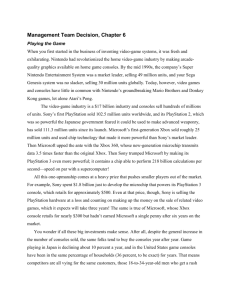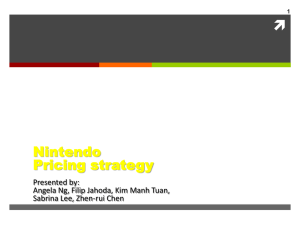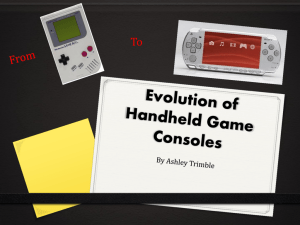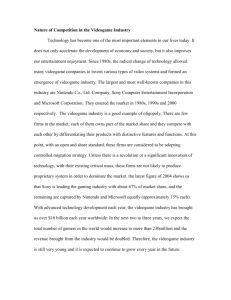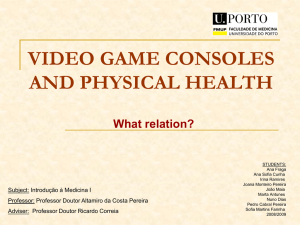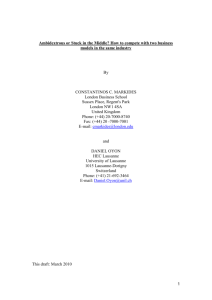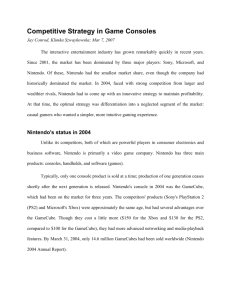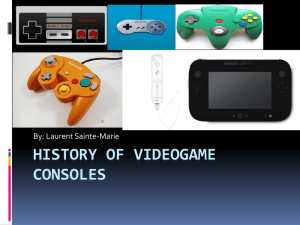mgt_235_master_2 - Anthony Griffin, MBA
advertisement
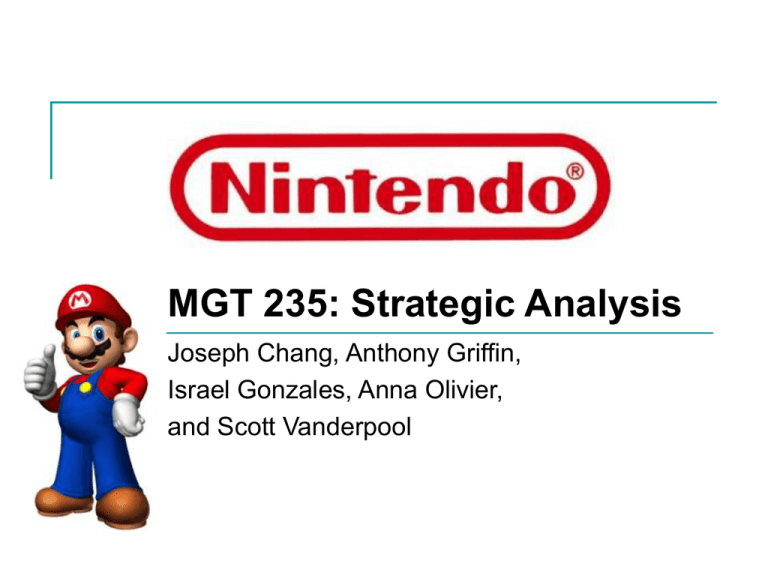
MGT 235: Strategic Analysis Joseph Chang, Anthony Griffin, Israel Gonzales, Anna Olivier, and Scott Vanderpool Background Video game console industry $10 Billion per year Nintendo First console: 1985 First-mover Current market Sony (Playstation: 1st), Microsoft (XBOX: 2nd), Nintendo (Gamecube: 3rd) Typical Life Cycle Introduction Growth Maturity Current Console Market X Decline Individual Game Console Cycle Introduction Growth Maturity Decline (Innovators/ Early Adopters) (Early market saturation) (Full saturation, R&D begins on next generation) (Introduction of new, phase out of old) 5-year Period (Average) Game Console Life Cycle Trend 5-year Cycle 20+ year Period Game Console Environment Introduction Growth Maturity Game Cube N64 SNES NES ’85-’89 ’89-’95 ’95-’98 ’98-’05 Decline 1985 – 1989: The Beginning Players: Nintendo (NES), Sega (MS) First mover: Nintendo Nintendo market share: 90% 1989 – 1995: The 16-bit Generation Players: Nintendo (SNES), Sega (Genesis), First mover: Sega Nintendo market share: 60% 1995 – 1998: Dawn of the PlayStation Players: Nintendo (N64), Sony (PS), Sega (Saturn) First mover: Sega Nintendo market share: 23% Nintendo Sony 1998 – 2005: 128-bit and Beyond Players: Sega (DC), Sony (PS2), Nintendo (GC), Microsoft (Xbox) First mover: Sega Sega exits hardware market Nintendo market share: 14% Nintendo's Market Share 1989-2006 90% 60% 23% 14% 1989 1995 1998 2006 Console Market Share (2006) Nintendo 14% Microsoft 17% Sony 69% Strong Industry Profits High Entry Barriers High start-up & marketing cost, brand equity Weak Suppliers Sony Microsoft Nintendo Low rivalry, 3 players, $10 billion market Substitutes Weak Weak Buyers High switching cost Competitive Advantage 1985 Industry Infancy 1st Mover Console Advantage 1988 Industry Present 1st Mover Portable Advantage* *Console Market: $10 billion per year industry Portable market: 10% of home console market ($ 1 billion per year) Strategic Issue How can Nintendo regain lost market share in the home console market? Exit the Home Console Market Pros Eliminate expensive hardware and focus on producing software (e.g. Sega) Allocate resources to concentrate on portable market Cons Lose out on licensing revenue Portable market is significantly smaller than home console market Expand Third Party Software Support Create incentives to entice game developers Lower licensing fees, advertising benefits, easy platforms Pros A variety of games attract larger market share Additional exclusive titles attract more consumers Cons Hard to motivate third party developers Incentives can be costly Exclusivity of Nintendo products Decrease in market share appears unprofitable Upgrade the Home Console Add new features: DVD, online, HD, etc. Pros Caters to new generation’s needs Online gaming components can add extra revenue streams Cons High costs in developing new console Two large players dominate this part of the market Focus on Untargeted Market Low price and user friendly approach Pros Tap into the untargeted market including women and baby boomers Gain market share without stealing it from competitor Cons Low price limits the graphical capabilities of Nintendo’s home console hardware Too broad: opinion leaders (hardcore gamers) may be turned off by this approach Rationale: Industry Trends The increasing age of the average gamer 2000: Average age is 28 2005: Average age is 33 Broadening demographics 43% of all gamers are women Women over the age of 18 represent a greater portion of the game playing population (28%) than boys from ages 6 to 17 (21%) 25% of all gamers are 50 and up In 2004, 19% of Americans over the age of 50 played video games, an increase from 9 percent in 1999 Source: The Entertainment Software Association Final Recommendation Nintendo 1985 Focus on an Untargeted Market Gamers over the age of 50 are a growing market Female gamers are increasing in number Potential in untargeted gamers Low price and user friendly approach Sony 1995 Nintendo 2006 “The optimist sees opportunity in every danger; the pessimist sees danger in every opportunity.” -Winston Churchill “The worst thing that you can do is to compete with your rival on the same things.” -Michael Porter

